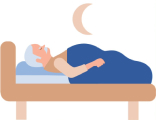Incontinence Education
What is incontinence?
Incontinence is defined as an involuntary and uncontrollable leak of urine occurring both during the day and at night. The loss of urine varies from person to person and can go from a couple of drops due to effort to a complete and involuntary emptying of the bladder. So, we’re talking about urinary incontinence. Faecal incontinence also exists.
Incontinence is not an illness but, most of the time, a symptom linked to a physical problem. In the majority of cases, there are solutions to solve this issue or control it. That’s the reason it is important to talk about it with your doctor.
Types of Incontinence
There are different types of incontinence that manifest themselves in different ways depending on the person. Below is a list of the most common forms.

Stress Incontinence
This is a weakness of the pelvic floor muscles and/or urinary sphincter, which means that the bladder’s “exit door” doesn’t close correctly. Urinary loss can occur in little gushes, when you laugh, cough or during physical effort. This incontinence is often linked to a lack of tone in the pelvic floor. It’s the most frequent form of incontinence and it affects women especially.

Urge Incontinence
This type of incontinence translates to a very frequent urge to urinate that doesn’t leave enough time to get to the toilet. This form is linked to hyperactivity in the bladder muscles, which contract abnormally. Urine leakage occurs if the urge to urinate cannot be satisfied quickly enough. The leak can happen suddenly, just by touching water or hearing water flow, for example, or even when you anticipate going to the toilet (when arriving at home, the simple act of putting the keys in the door).

Overflow Incontinence (or Urine Retention)
This incontinence is explained by a problem in the discharge function of the bladder, meaning an “overflow”. This mechanism leads to bladder leaks, drop by drop, because it’s just the overflow that is evacuated. This is the most common form in men. This can happen in particular when the size of the prostrate increases.

Functional Incontinence
This type of incontinence translates to a person’s inability to get themselves to the toilet because of a cognitive or physical disability. It often occurs in elderly people who have difficulty moving or in people with Alzheimer’s.

Total Incontinence
The sufferer can no longer exercise any control over their bladder. Total incontinence is often the consequence of a physical injury, a spinal cord illness, a destruction of the sphincters, etc.

Nocturia and enuresis (Night time incontinence and bed-wetting)
The term nocturia refers to the abnormally increased need to urinate during the night. This can affect adults suffering from kidney problems leading to renal failure or men suffering from a begin hypertrophy of the prostate. People suffering from enuresis urinate when they sleep, most often at night.
Advice and Practical Information
Here is some simple advice to help you tackle your bladder problems on a daily basis and enjoy life to the fullest.

Keep hydrated
Make sure you drink plenty of water. If you don’t drink enough water, your urine will be more concentrated and could irritate your bladder. It is important to drink enough water while eating a balanced diet.

Curb your consumption of alcohol
Consuming alcohol affects the messages that your brain sends to your bladder to tell it when to hold on to urine and when to get rid of it. We would therefore advise reducing your alcohol consumption as much as possible.

Avoid fizzy drinks
The carbon dioxide in this type of drink can irritate a sensitive bladder and give you an urgent need to urinate.

Avoid caffeine
Stop or reduce your caffeine consumption because it can make you need to go to the toilet and prompt your body to rid itself of liquids. You should avoid fizzy drinks, tea, hot chocolate and even decaf coffee.

Avoid spicy food
Avoid eating spicy food like Mexican or Chinese dishes, pepper, chilli or horseradish if you have an overactive bladder because these foods can cause bladder irritation.

Avoid acidic food
Citrus fruit or tropical fruit juices, like orange and pineapple, contain acid and can irritate your bladder. They can make you need to go to the toilet more often. Tomatoes and cranberries are also acidic.
Continence
Housekeeping
Drinking & Dining
Infection Control
Covid-19
Personal Care
